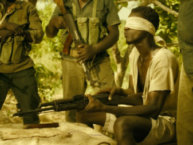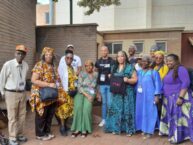 The 2014 Caine Prize for African Writing Workshop is currently taking place in Zimbabwe. Ahead of the event, Fungai Machirori conducted a few interviews with Zimbabwean writers and publishers, as well as Caine Prize Director, Lizzy Attree. Fungai’s article of what was discussed can be found here. “Realising how much great content would go to waste from what was left out of the article,” Fungai Machirori says, ” I have decided to share the full transcripts of my conversations.” The first of such conversations has already published here. In the following conversation, Fungai speaks “to 26-year-old Novuyo Rosa Tshuma about what becoming a writer entails and means to her.”
The 2014 Caine Prize for African Writing Workshop is currently taking place in Zimbabwe. Ahead of the event, Fungai Machirori conducted a few interviews with Zimbabwean writers and publishers, as well as Caine Prize Director, Lizzy Attree. Fungai’s article of what was discussed can be found here. “Realising how much great content would go to waste from what was left out of the article,” Fungai Machirori says, ” I have decided to share the full transcripts of my conversations.” The first of such conversations has already published here. In the following conversation, Fungai speaks “to 26-year-old Novuyo Rosa Tshuma about what becoming a writer entails and means to her.”
Fungai Machirori(FM): You took part in the Caine Prize Workshop in 2010. Would you say it benefitted you in terms of your writing and exposure? Can you explain?
Novuyo Rosa Tshuma (NRT): It did benefit my writing. I was 22 at the time, and that setting where writers have their works read and critiqued by fellow participants, as well as the one on one sessions with the animateurs, was useful to my story and my writing process.
FM: You have gone on to write a novella. Did you ever think of publishing it in Zimbabwe? What were the factors that led to your not doing so?
NRT: I sent the novella to several publishers, including publishers in Zimbabwe. Publishers in Zimbabwe were not interested in publishing it; interestingly, publishers in South Africa were more receptive to the work. However, frustratingly, they (South African publishers) kept saying the same thing; though they liked the work, the market was currently precarious, and their focus was specifically on the South African market, while my novella took place primarily in Zimbabwe.
I got many rejections during this time, and it was a frustrating period. However, I kept sending out the work.
I initially published the novella with Kushinda, a new arts outfit based in the UK; I then switched publishers to the South African publisher, Kwela, and the novella was made part of a short story collection. This was the beginning of exciting times for myself as a writer, you could say the sun was beginning to filter through the clouds. My novella had been accepted by a reputable publisher I was excited to be working with, I was working with a wonderful editor, Lynda Gilfillan – working with a good editor is one of the most enjoyable parts of the writing process – and I had been accepted in several MA/MFA Creative Writing Programmes, meaning I would not have to continue careening down the Commerce Field. I was completing a BCom in Economics and Finance at the time – the prospect of which led to many sweaty, sleepless nights.
FM: You are one of the few currently renowned local writers under 30. Why do you think there is such a dearth of young voices in the literary landscape in Zimbabwe? What can be done to augment these voices?
NRT: I’m not sure why there is a dearth of young voices in Zimbabwe’s literary landscape. I actually know several very talented, young Zimbabwean writers, whose writing is simply breathtaking, and who I hope will do something with their writing talent. I suppose the most important thing is the will to write; one simply has to be willing to write, to make time to write, and to make time to improve one’s writing, and to seek opportunities and spaces that may improve one’s writing. To read ravenously. To be literarily curious. To experiment. To be willing to fail. To be rejected. And still keep at it.
Writing and finding oneself as a writer takes many years, and requires consistency, determination, passion, love, dedication. Of course, Zimbabwe has seen hard times and all of that; but then you look at Kenya, for instance, and Nigeria, and in spite of their social landscapes, writing among young writers thrives there. Of course, much can be done to augment literary spaces which already exist and literary diversity on the ground; this would indeed help. However, I don’t believe in spoon feeding a writer, and young writers should not wait to be spoon fed. I myself started writing in Zimbabwe, in exercise books, and I would go to internet cafes to type my writing. The question is, if an opportunity were to present itself today, would you have something written down on the page? Already, we have great inspiration in the likes of our wonderful writers such as NoViolet Bulawayo.
FM: Your novella tackles some of the pertinent socio-political issues that have dominated Zimbabwe’s discourse over the last decade and a half. Do you think it’s possible to write an ‘authentic’ narrative about Zimbabwe without incorporating these themes? Do you feel, in any way, confined by them?
I don’t know what an ‘authentic’ narrative is. I encourage every writer to discard this word from their vocabulary when writing. There are many different Zimbabwes, different ways of seeing Zimbabwe; they are as many as are the pens currently imagining that space into existence. I don’t feel confined at all.
For me, writing is such a demanding process, of one’s time and emotions and energy and intellect, a process which honours and demands to be honoured, and which when it is disrespected will in turn disrespect. There is no space for pretension, for writing things about which one cares little. It is a terrible waste of one’s time. As such, everyone should write whatever it is that tickles them; for me, I am tickled by our society, by these things that have happened to us which have left these gaping craters in our beings; craters which, having been empty for so long, have been filled with strange things which rattle in young mouths like an old man’s cough, which make us laugh where we would cry.
Zimbabwe in the past decade and a half has been so strangely traumatic, in both subtle and direct ways; it was such a tremendous shift from what we previously knew, such that at times one looks back and has to remind oneself that it was not a nightmare. It affected us and our families and our communities in profound ways, I believe, and this is a deeply emotional thing, particularly when one steps away from that space. In so many, many many ways. Different ways. Funny ways. Heart breaking ways. Heart warming ways. Ways which we do not even know. Ways which have seeped into our subconscious and coloured the myriad ways in which we see the world. That is the beauty and pain of discovery through the pen.
Even in my short fiction, without being very aware of this at the time, I was writing about these things. One starts with little questions, which make little dots across the imagination and link to other, bigger questions, geriatric questions, rotting questions which have fermented into our present, the cadavres of which we can no longer seem to find, no matter how vigorously we rummage through this corrupted, corruptible and corrupting history of ours which is at once personal and collective.
FM: You are currently at the Iowa Writers’ Workshop. Do you find it easier to write about Zimbabwe from a distance, or from within?
NRT: I am enjoying the distance, as it gives one space to think, and view Zimbabwe from all sorts of perspectives.
FM: Do you think you would publish your first full-length novel in Zimbabwe first, or would you go for the international sector first?
NRT: I’m not worried about any of that. Right now, it is the writing which is worrying me, compulsively, delightfully worrying me, and it is all I am interested in right now.
Novuyo Rosa Tshuma, currently pursuing an MFA at the Iowa Writers’ Workshop, is the author of the book Shadows. Her short fiction has been featured in publications like African Roar 2010, A Life in Full and Other Stories: Caine Prize Anthology, The Bed Books of Short Stories, Where to Now? Short stories from Zimbabwe, Sentinel Literary Quarterly, Munyori Literary Journal and many others. She won the Intwasa Short Story Competition 2009, now known as the Yvonne Vera Award, for her short story “You In Paradise”. She was shortlisted for the Zimbabwe Achievers Literature Award 2012 for her short story “Doctor S”.
Fungai Machirori is a creative writer whose areas of passion are the written word (journalism and poetry), photography and new media. She is also the Founder and Managing Editor of Her Zimbabwe and describes herself as being on a continuous journey to self-discovery. She blogs at Fungai Neni.






4 comments for “Fungai Machirori Interviews Novuyo Rosa Tshuma”